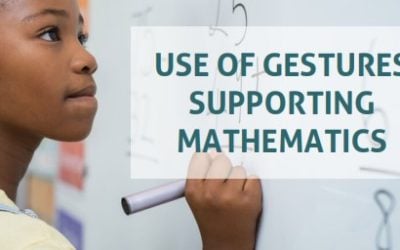It's important to be aware that although many dyslexics have natural strengths in math reasoning and scientific thinking, these strengths may not be evident during K-12 education because of challenges with symbol confusion and polysemous or multiple meaning words in...
Use of Gestures Supporting Mathematics
There's an interesting paper by Hord and colleagues that showed how a secondary math teacher supported a student with LD and math anxiety using gestures. Gestures can sometimes be used to help remember and retrieve math actions and relationships in long-term memory....
Teaching Geometry to Dyslexic Students [Premium]
“Henry Winkler… got his diploma in the mail only after taking the same geometry class eight times in a row over the course of four years, during the summers and regular school semesters, and finally passing with a D-.” — Alia Wong, “The MisEducation of the Fonz”, Atlantic Monthly It’s surprisingly hard to find research publications on teaching geometry to dyslexic students. One reason, suggested by Kay and Yeo in their book Dyslexia and Maths, is that numerical difficulties are more common among dyslexic students than geometric ones. They cite one study of 92 students followed over four years in which 50% failed to meet standards in Number Work, compared to 27% who missed for “Measure, Shape and Space.” That being said, because geometry is […]
Building on Strengths in Math
Up to 70% of dyslexic people also have dyscalculia (specific math disability), although specific math supports or interventions are rarely a part of public school IEPs or 504's. Part of the reason there is less support for math among dyslexic students in the US is...
Math Problems: Does It Matter If It’s Identified As A Math Disability? [Premium]
There are millions of school children struggling with math at school. Does it matter if a student’s math struggles are identified formally as a math disability or dyscalculia? 40% of dyslexic people are likely to also have dyscalculia, but because dyscalculia is rarely assessed in schools, few individuals ever receive that designation. Does it matter? In the short term, some school professionals might say it does not matter much – because students who need help in math will get it if their scores qualify. What do we believe? Having a math LD formally identified can be helpful – although we realize that testing may not always be easily available. If you are a testing professional, consider adding the WIAT Math subtests to routine comprehensive battery […]
Math: Teaching with Physical Materials [Premium]
Almost half of all dyslexic student may have math disabilities (Wilcutt et al.2013), but math disabilities or dyscalculia are rarely recognized in public or private schools in the US. All the more important for tutors, teachers, and parents to be aware of dyslexia-related differences in learning better ways of helping information ‘stick’. One helpful example for how to support math for dyslexic students comes from the Sagonaska Demonstration School. They have completely embraced multisensory learning and have considered how reading and writing challenges can affect the way students learn and show their work. Third Space Learning has nice graphics about this approach. Briefly, it involves introducing new math concepts with physical materials, then switching to the use of drawings (representations) to work […]
Schools Missing the Boat on Dyslexia and Math [Premium]
Forty-four percent of dyslexic students also meet diagnostic criteria for math disability, according to researchers, but math rarely receives specific designations on students’ individualized education plans. What is the result? Dyslexic students with math disabilities underperform, fail, get held back, and find themselves excluded from certain academic tracks and majors (like science, technology, and engineering). What they really need though are informed teachers and school programs that understand their specific needs and teach them based on their strengths. CHALLENGES AND STRENGTHS IN MATH In a review of 50 consecutive dyslexic students seen in our clinic, the following patterns were seen in their WISCIV IQ and WIAT-III achievement scores. Our practice was unusual because we had many gifted referrals from the Silicon Valley and many students […]
Multiplication [Premium]
Multiplication has always been my nemesis. When I was testing a student and Brock heard me hesitate when a student was answering a math fact, he took that job away from me. I know I’ve spoken about the stories and mnemonics at Multiplication.com before, but if this approach is not a match for your student, consider multiplication chart or machine approaches which also use both visual and kinesthetic approaches to remember. One thing we had in our house was a Multiplication Machine like this one from Lakeshore Learning: It’s a low-tech gadget but surprisingly is attractive for kids practicing their times tables. It especially helps those who are kinesthetic learners – pressing on the number to get the answers reinforces the facts. For kids who […]
Memory Problems and Math [Premium]
Many students and adults attribute difficulties in math to memory problems, but probing these difficulties further often leads to the realization that it’s not a simple matter of remembering or forgetting, but rather trouble defining, organizing, then retrieving what has been learned. PROBLEMS DEFINING AND UNDERSTANDING ‘WHY’ First of all, if a student is struggling with remembering new information, it’s best to check and see if the definitions, procedures, and the why of procedures are clear. In fact, it may be a flipside of a strength in long-term memory that contributes to dyslexic students’ confusion with ambiguous terms. A good example of this James Tanton’s blog post: When fractions are introduced as pieces of pie, 3/5 + 1/5 makes sense to equal 4/5, but what […]
Organizing Math [Premium]
Math is a challenge for almost every student as the world recovers from disruptions due to the pandemic. Although almost all community colleges waive some math requirements, only a few colleges completely waive them. One list I found was here, but do check individual college sites for current information. 1. University of Arizona – Substitution allowed 2. University of the Ozarks – Substitution for College Algebra 3. California Polytechnic State University – Substitution for non-math majors 4. Cal State Fullerton – Math substitution 5. Cal State Long Beach – Math substitution 6. Cal State San Bernadino – Math substitution 7. Menlo College – Math substitution 8. Santa Monica College – Math substitution 9. Sierra College – Math waiver 10. UC Berkley – Math waiver 11. […]
Math Games for All [Premium]
Math games are a great way to build a hands-on sense for number flexibility and quantity. The best situation is if hands-on and visual math activities are started from the beginning, but the good news is that it’s never too late to start. Even students who are taught almost exclusively in rote/symbolic ways can benefit by activities and reinforcements at home or in out-of-class tutoring sessions. SUBITIZING AND NUMBER SENSE Subitizing is a term that refers to a rapid and confident judgment about a small number of items. If you have three coins in your hand or five do you quickly know how many coins there are without having to count? That number sense is important before progressing to higher calculations. Click on the photos […]
Dyslexia and Math: Knowing Why [Premium]
It’s been estimated that almost half of dyslexic individuals will also be dyscalculic (Wilson et al., 2014), but dyscalculia is less likely to be assessed or formally identified in school, leaving students to flounder on their own. WHY IS DYSLEXIA COMMONLY ASSOCIATED WITH MATH LD? Experts still debate why there is such significant overlap, but at least one recent study found that spatial difficulties were especially associated with students with dyscalculia or those with both dyslexia and dyscalculia. Besides spatial factors, difficulties in sequencing, trouble with symbols, working memory overload, and rote math fact retrieval are all difficulties commonly seen among dyslexic students and those with dyscalculia. What is not particularly common among dyslexic students is difficulty with math reasoning – in fact for […]

![Math and Sciences: Symbols and Dyslexia [Premium]](https://www.dyslexicadvantage.org/wp-content/uploads/2024/03/Math-and-Sciences-1-400x250.jpg)

![Teaching Geometry to Dyslexic Students [Premium]](https://www.dyslexicadvantage.org/wp-content/uploads/2024/02/Teaching-Geometry-to-Dyslexic-Students-400x250.jpg)

![Math Problems: Does It Matter If It’s Identified As A Math Disability? [Premium]](https://www.dyslexicadvantage.org/wp-content/uploads/2023/07/MATH-PROBLEMS-DOES-IT-MATTER-IF-ITS-IDENTIFIED-AS-A-MATH-DISABILITY-D_A-400x250.png)
![Math: Teaching with Physical Materials [Premium]](https://www.dyslexicadvantage.org/wp-content/uploads/2023/05/Teaching-with-Physical-Materials-e1683788874447-400x250.jpg)
![Schools Missing the Boat on Dyslexia and Math [Premium]](https://www.dyslexicadvantage.org/wp-content/uploads/2023/03/SCHOOLS-MISSING-THE-BOAT-ON-DYSLEXIA-AND-MATH-400x250.png)
![Multiplication [Premium]](https://www.dyslexicadvantage.org/wp-content/uploads/2023/02/multiplication-envato-400x250.jpg)
![Memory Problems and Math [Premium]](https://www.dyslexicadvantage.org/wp-content/uploads/2023/02/Memory-Problems-and-Math-Premium-400x250.png)
![Organizing Math [Premium]](https://www.dyslexicadvantage.org/wp-content/uploads/2023/01/020-math-book-400x250.png)
![Math Games for All [Premium]](https://www.dyslexicadvantage.org/wp-content/uploads/2023/01/Math-Games-for-All-1.jpg)
![Dyslexia and Math: Knowing Why [Premium]](https://www.dyslexicadvantage.org/wp-content/uploads/2022/12/Dyslexia-and-Math-Knowing-Why-Dyslexic-Advantage-C.jpg)













